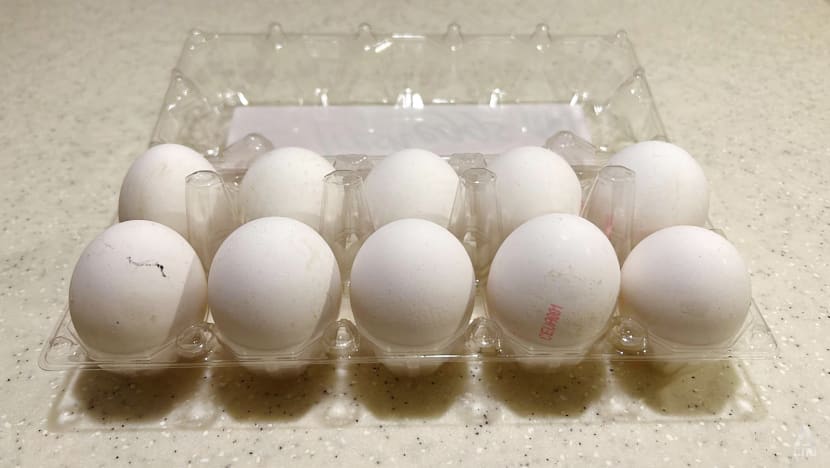Singapore recalls eggs imported from Ukrainian farm due to presence of salmonella bacteria
The affected eggs from LCC Yasensvit farm in Ukraine can be identified by the stamp CEUA001 on them.

A tray of eggs imported from LCC Yasensvit farm in Ukraine.
SINGAPORE: The Singapore Food Agency (SFA) has ordered the recall of eggs imported from a Ukraine farm after detecting the presence of salmonella.
The affected eggs can be identified by the stamp CEUA001 on them, SFA said in a media release on Tuesday (Aug 8). All batches with this farm code are affected.
The Ukrainian farm, LCC Yasensvit, has been suspended from exporting eggs to Singapore.
"SFA will lift the suspension only when the farm has rectified the salmonella enteritidis contamination issue," the agency added.
Salmonella enteritidis may cause foodborne illnesses if the food is consumed raw or undercooked.
But because the bacteria can be destroyed by heat, eggs are safe to consume if they are cooked thoroughly, said SFA, adding that it directed importers to withhold or recall the affected eggs as a precautionary measure.
Symptoms of salmonella include diarrhoea, abdominal pain, fever, nausea and vomiting.
While the infection typically subsides within a week in most people, salmonella can cause serious infection in the vulnerable such as the elderly, young children and those with weakened immune systems.
SFA advises consumers who have bought the affected eggs to cook them thoroughly before eating them. Those who have consumed the eggs and are unwell should seek medical attention.
Singapore's largest supermarket chain FairPrice said on Wednesday (Aug 9) that it has since removed the affected eggs from its stores.
Customers who have purchased the eggs can get a full refund if they return them at FairPrice stores by Aug 15.
"FairPrice Group takes food quality and safety issues very seriously and is committed to upholding a high level of food safety standards," added a spokesperson in response to CNA's queries.
DFI Retail Group, which operates Cold Storage, said the supermarket does not stock the affected eggs.
CNA has also contacted the Sheng Siong chain for more information.
Salmonella and eggs
What is Salmonella?
Salmonella is a type of bacteria that is naturally present in the intestines of animals and can be found on food such as raw meat, raw dairy products, poultry and eggs.
Salmonella can be spread to humans through the consumption of contaminated food and drinks.
In affected individuals, the bacteria can colonise the intestines to cause gastrointestinal illness. The symptoms include diarrhoea, abdominal pain, fever, nausea and vomiting.
While the infection typically subsides within a week in most people, Salmonella can cause serious infection in vulnerable population such as the elderly, young children and those with weakened immune systems.
How does it occur in eggs?
Eggs can be contaminated with Salmonella in two ways.
The first way is via faecal contamination. As Salmonella can often be found in the gut and faeces of chickens, the insides of the egg may be contaminated when bacteria in the faeces enter through pores on the shells, or when egg shells are cracked.
The second way of egg contamination is exclusive to one particular type of Salmonella known as Salmonella Enteritidis (SE).
In SE-infected layer hens, the bacteria can be found in their ovaries and they enter the eggs even before the shells are formed. Infected hens do not appear sick but will occasionally lay SE-contaminated eggs that can cause food-borne illnesses if the eggs are not handled or cooked properly.
How to reduce the risk of food poisoning?
- SFA states on its website that consumers should buy eggs from SFA-approved businesses and ensure that the shells are clean, free from faecal contamination and not cracked.
- Cook the eggs thoroughly until both the yolks and whites are firm. Runny egg whites or yolks may still contain bacteria.
- Consider using pasteurised eggs for dishes that require raw or lightly cooked eggs. The dishes include desserts such as tiramisu, as well as sauces and dressings such as hollandaise sauce.
- Eat eggs or dishes containing eggs as soon as possible after cooking. Refrigerate (below 4 degrees Celsius) food containing eggs promptly to avoid the growth of bacteria that may be present in the dish.
- Wash your hands thoroughly with soap before and after handling eggs to prevent the risk of cross-contamination.
- Use separate crockery and utensils for raw eggs and ready-to-eat or cooked food.
SINGAPORE'S EGG IMPORTS
Singapore imports about 70 per cent of its eggs from 18 countries and regions.
The import of eggs from Ukraine was approved in 2019 as part of efforts to diversify Singapore's food sources and meet local demand.
SFA said in December that the upcoming development of Singapore’s fourth egg farm will further strengthen the resilience of the country’s local egg supply.
Once fully operational, Singapore’s local egg farms will meet about 50 per cent of the country’s egg demand.
SFA said both imported and local eggs are subject to its inspection and testing.
"Eggs imported into Singapore must come from accredited sources that meet SFA’s food safety and animal health standards," the agency said.
As part of its accreditation criteria and import conditions, farms have to be free from Salmonella Enteritidis. Local egg farms are also required to have good farm management practices and strong biosecurity measures in place to prevent the risk of Salmonella Enteritidis contamination.
These include having a grading system to remove eggs that are soiled or cracked, as well as regularly testing hens for Salmonella Enteritidis to remove eggs from infected flocks from sale.














